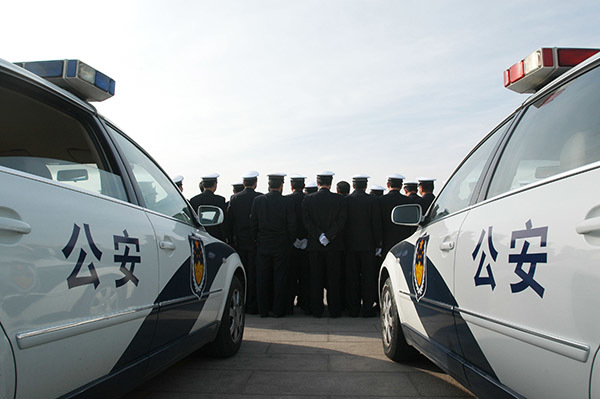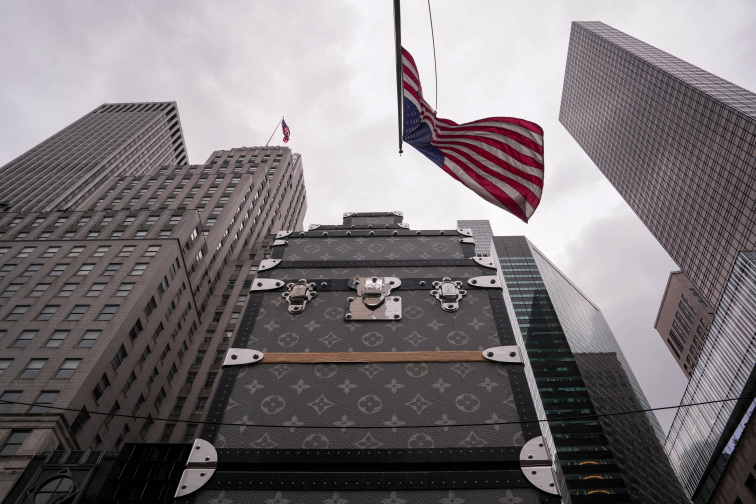Elderly residents in rural China receive pensions of just over 100 yuan a month—barely enough to buy meat. A netizen who filmed related videos asked, “If our parents live like this, what meaning does our growing up have?” These videos, however, were removed because they did not “tell a good China story” as mandated by authorities. (Video screenshots)
[People News] While China’s National Bureau of Statistics reports a 5.3% GDP growth for the first half of the year—a figure frequently contested—recent incidents of governmental embarrassment have sparked major online criticism.
A Local Government’s 30,000-RMB Dining Bill Goes Unpaid for Five Years
Henan resident Ms. Su reported to Jimu News that her parents, who formerly ran a restaurant in Yuanlao Township, Shangshui County, provided meals for the County Grain Bureau’s poverty-alleviation team during their fieldwork from March 2020 to January 2021. The officials left behind 68 handwritten IOUs totalling 28,285 RMB, which remained unpaid for five years, prompting the elderly couple to fall ill and eventually shut the business.
Su stated that while some IOUs were as small as a hundred RMB, others involved 30 people and totalled over 800 RMB. One signatory—identified as Zhu—owed more than 20,000 RMB. Officials repeatedly made excuses such as funding difficulties, absent leadership, and frozen bank accounts. After years without resolution, Ms. Su filed a complaint with the county Discipline Inspection Commission.
According to Mr. Zhu, the unit doesn't just owe money to this one business — there are several others waiting for payment. He explained that the unit has no funds, so payments have been continuously delayed. Recently, the bureau decided to try settling the debt through instalments, but the other party refused. A staff member from the publicity department of Shangshui County told reporters, “Right now, even getting reimbursements approved is difficult for the unit. We will pay them off little by little — but we won’t refuse to pay.”
Public backlash quickly followed. Netizens commented: “They’ve been eating on IOUs for five years — just the interest alone would be worth several thousand yuan. And they still have the nerve to talk about paying in instalments.” “Even in a platform-based economy, I’ve never heard of dining at a restaurant on instalment plans.” “Public servants dining for free — it's not just shameless, it's ugly.” “Is this poverty alleviation or poverty creation?” “When it’s money owed to ordinary people, it’s always a fuzzy account. But if it were money owed to the government, they would’ve already confiscated your property.”
Under media exposure and public pressure, on July 25, Mr. Zhu from the Shangshui County Grain Bureau and other individuals who had signed the IOUs finally settled the outstanding payments, claiming that they had paid the amount out of their own pockets in advance.
A netizen commented: “It took five years just to pay off a meal bill — and they still talk about ‘leading the world in chip technology’?”
This incident also reflects how dire the financial situation of local governments has become. They couldn’t even find a way to cover a 20,000-yuan rural aid meal expense, and the delay lasted several years. Although 2020 and 2021 were during the pandemic, expenses like this — within standard limits and labelled as epidemic prevention — should still have been reimbursable. If it was that hard, then the situation now is even worse — there's simply no money left to cook the rice.
In the first half of the year, national fiscal revenue dropped by 1.2% year-on-year — making the Chinese government the world’s biggest defaulter.
In fact, the Chinese Communist Party (CCP) government is buried under a mountain of debt, with the amount reaching an astonishing level.
China’s government debt is soaring to staggering levels. Goldman Sachs estimates that by 2024, China’s broad government debt—including off-balance and contingent liabilities—reached 179 trillion RMB, or about 133% of GDP. This upward trajectory followed 165 trillion RMB (127% of GDP) in 2023 and 112 trillion RMB (111% of GDP) in 2019—an increase of roughly 60% from pre-pandemic levels.
According to the Ministry of Finance, on July 25, general public budget revenue in the first half of the year was 11,556.6 billion RMB, down 0.3% year-on-year. Fund revenue came in at 1,944.2 billion RMB, down 2.4%. Meanwhile, combined expenditure for the public budget and fund budget rose to 14,127.1 billion RMB (↑3.4%) and 4,627.3 billion RMB (↑30%), respectively. Overall fiscal revenue fell by 1.2%, with a deficit of 5,253.6 billion RMB.
To stimulate the economy, government debt issuance surged: Local debts amounted to 5,490.2 billion RMB, the highest in nearly a decade, including 2,160 billion RMB in new special-purpose bonds. The Ministry of Finance allocated 162 billion RMB from special super-long-term bonds for appliance subsidy programs, and issued 555 billion RMB of such bonds to bolster capital in state-owned commercial banks. Total national bonds issued reached 7,880 billion RMB, up 35.28%, though at an average interest rate of 1.52%—43 basis points lower year-over-year.
The magnitude of debt is staggering—from central to local levels, China’s financial liabilities continue climbing, as infrastructure investment remains the main outlet. For example, a 1.2 trillion RMB hydropower project on the Yarlung Tsangpo River in Tibet’s Nyingchi region was announced on July 19, amid concerns it could become another resource-wasting White Elephant.
China’s local governments are notorious for delaying payments to businesses and contractors. Tsinghua University professor and policy adviser Li Daokui disclosed in October that outstanding debts owed to enterprises and employees amount to about 10% of GDP, or 12 trillion RMB.
Yuan Haixia, executive director of Zhongchengxin International Research Institute, reported in December 2024 that government arrears—among enterprise receivables—exceeded 10 trillion RMB, roughly 8% of GDP.
Despite awareness, these debts remain largely unpaid. In Yunnan province, for instance, newly issued local government bonds did not initially include funds to settle agent debts to enterprises. Only after mid‑June was a special allocation of 35.6 billion RMB designated to local governments for repayment.
A building materials supplier in Taiyuan, Shanxi, stated, “Things are not like in the past. Now payments take over a year to process—sometimes projects start before funds arrive.” Post‑2024, contractors are often forced to front construction costs themselves.
In November 2024, the Ministry of Finance unveiled a 10‑trillion‑RMB debt restructuring plan—raising government debt limits by 6 trillion RMB and issuing annual refinancing bonds of 2 trillion RMB through 2026. From 2024 onward, yearly allocations of 800 billion RMB from new local government special bonds—totalling 4 trillion RMB—are set aside specifically for fiscal stability and old‑debt repayment.
For 2025, authorities plan to issue 4.4 trillion RMB in special local government bonds to finance infrastructure, land acquisitions, unsold housing inventory, and—last on the list—settle overdue debts owed to businesses. In practice, clearing business debts remains a low priority, as officials face no policy pressure to do so, it doesn’t yield political credit, and disbursing those funds reduces opportunities for corruption, which means few dare to act.
The CCP government remains one of the most prolific global debtors—but citizens cannot sue or pressure it for repayment. Those who attempt to demand overdue payments may find themselves accused of “malicious wage collection” or “provoking trouble.”
All Roads Lead to Food Delivery: The Public Remembers the 'Beauty of Economic Boom Times'
On July 15, China’s Ministry of Finance released mid-year fiscal revenue and expenditure data, claiming an 8% year-on-year increase in personal income tax. Netizens scoffed at the claim, joking, “I’m not just dragging behind—I’m dragging the entire back of the team!”
At the start of 2025, Reuters reported that the Chinese Communist Party (CCP) planned to raise the monthly salary of 10 million civil servants by 500 yuan each. Many mocked it as “saving the officials to save the people.” Meanwhile, NetEase noted that the central government called for wage increases three times in the first half of the year, but "only tears and saliva rose, not wages."
Instead of increases, wage cuts among civil servants have become more common. In Zhejiang, general government employees reportedly saw their annual income fall by 50,000 to 60,000 yuan, while officials at the deputy division level and above had cuts of over 100,000 yuan. In parts of Shandong, government workers began receiving only 70–80% of their salaries from 2024 onward. In Guangdong, some police officers’ annual salary dropped from 300,000 to 200,000 yuan, and frontline civil servants were left with only about 3,000 yuan per month.
Recently, in Suining, Sichuan, a Disciplinary Inspection Commission official named Mr. Sun made headlines when he started delivering food immediately after work each day, earning about 100 yuan in three hours each night. This story quickly trended online. Just a few years ago, moonlighting by public employees was strictly forbidden under CCP disciplinary and civil service regulations, due to fears of corruption or abuse of power.
However, on July 10, Mr. Sun’s department issued a notice permitting staff to take on side jobs. The very next day, he applied to deliver food and was approved. He said many of his colleagues are also joining in—some are delivering groceries, others are driving ride-share.
Users on Xiaohongshu noted that Mr. Sun chose to work after 8 PM, avoiding the lunch, dinner, and late-night delivery peaks, yet still made 100+ yuan, making his hourly wage exceptionally high.
This is a stark contrast to past cases: In 2016, Beijing News reported a deputy township chief in Huangshan, Anhui, who was disciplined for driving for a ride-hailing service to repay debt. In 2021, a Beijing human resources bureau deputy division-level official delivered food for 12 hours and earned only 41 yuan. Now, Mr. Sun describes delivery as fun like playing a video game, and his story has become an inspirational tale in a time of economic decline, even seen as “spiritual chicken soup” for struggling civil servants.
Some suspect the CCP is endorsing food delivery and ride-hailing as acceptable fallback careers, rebranding economic desperation as entrepreneurial hustle. The 2024 Meituan Rider Report noted a sharp increase in young people and women joining the delivery workforce.
But tragedy struck on July 25, when a 24-year-old female courier in Yixing, Sichuan, was swept away by a sudden flood on her way home from work. Her body was recovered by rescuers. Just the day before, she had posted a video online. She leaves behind a 2-year-old child. The story left many readers in tears and disbelief. Can food delivery really be as fun and easy as Mr. Sun described?
Delivery workers’ lives matter too. Amid China’s economic downturn, countless industries are collapsing. The wealthy are fleeing, the middle class is slipping into poverty, and the working class is suffering even more. When Disciplinary Commission officials have to deliver food to survive, it’s not a sign of open policy—it’s the CCP shedding responsibility and throwing its burdens on the people.
The Wall Street Journal recently reported that when official data is unreliable, trends on Chinese social media offer clearer insights. One viral phrase—“the beauty of economic boom times”—reflects a growing sense of defeat among job seekers. In the 2000s and 2010s, it was normal for college graduates to receive multiple job offers—now this is a nostalgic memory.
Goldman Sachs' wage tracker shows that since China ended “zero-COVID” in Q1 2023, salary growth has consistently declined. Ernan Cui from Gavekal Dragonomics noted that a Cheung Kong Graduate School of Business survey found hiring over the past two years has been significantly weaker than average. Some indicators suggest that even those who find jobs are earning less than before.
In reality, the so-called “beauty of boom times” was just an illusion created by the CCP during its reform and opening period—another tactic to pacify the public. What we’re witnessing now is the true face of the CCP system—finally laid bare by its own collapse.
(First published by People News) △










News magazine bootstrap themes!
I like this themes, fast loading and look profesional
Thank you Carlos!
You're welcome!
Please support me with give positive rating!
Yes Sure!